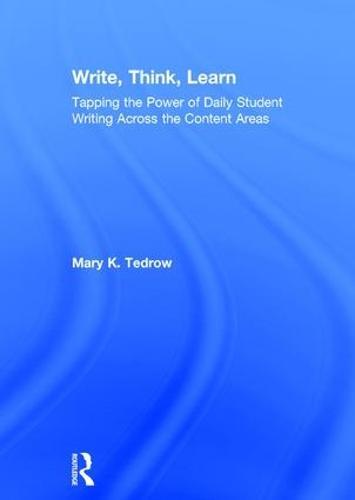Overview
Find out how to create the climate and space for everyday student writing. In this new co-publication with MiddleWeb, award-winning teacher Mary Tedrow shows you how to encourage students to integrate daily writing into their lives, leading to improved critical thinking skills, increased knowledge of subject areas, and greater confidence in written expression. This practical guide will help you consider the unique needs of your students, while still meeting state standards. You’ll discover how to… Develop classroom routines and activities that invite creativity and self-expression Teach writing methods that can be used across different grade levels and all content areas Challenge students to examine their own writing processes for thinking and problem solving Evaluate written work in a way that emphasizes growth over grades Many exercises, prompts, and attempts at thinking found in the book can be easily adapted for use both in and out of the classroom. Whether you are a new or experienced teacher, Write, Think, Learn will enable you to make writing come alive for all your students.
Full Product Details
Author: Mary Tedrow
Publisher: Taylor & Francis Ltd
Imprint: Routledge
Weight: 0.385kg
ISBN: 9781138052703
ISBN 10: 1138052701
Pages: 184
Publication Date: 21 August 2017
Audience:
Professional and scholarly
,
College/higher education
,
Professional & Vocational
,
Tertiary & Higher Education
Format: Hardback
Publisher's Status: Active
Availability: In Print

This item will be ordered in for you from one of our suppliers. Upon receipt, we will promptly dispatch it out to you. For in store availability, please contact us.
Reviews
Mary Tedrow's book Write,Think, Learn offers an excellent collection of practical instructional strategies teachers can use to help their students become better writers. I know that I will be using many of them myself! --Larry Ferlazzo, English and Social Studies Teacher, EdWeek blogger, and author of several books, including Building a Community of Self-Motivated Learners: Strategies to Help Students Thrive in School and Beyond The best advice ever for writers is the Roman maxim, 'nulla dies sine linea'-never a day without a line. In this practical and motivating book, master teacher Mary Tedrow shows how to use daybooks to build fluency, engage course content, and reflect on learning. Through daily practice, students come to view writing as a natural form of expression-not an attempt to fit someone else's imposed formula. --Thomas Newkirk, Award-Winning Author, Educator, and Professor Emeritus, University of New Hampshire ã
Mary Tedrow's book Write,Think, Learn offers an excellent collection of practical instructional strategies teachers can use to help their students become better writers. I know that I will be using many of them myself! --Larry Ferlazzo, English and Social Studies Teacher, EdWeek blogger, and author of several books, including Building a Community of Self-Motivated Learners: Strategies to Help Students Thrive in School and Beyond The best advice ever for writers is the Roman maxim, 'nulla dies sine linea'-never a day without a line. In this practical and motivating book, master teacher Mary Tedrow shows how to use daybooks to build fluency, engage course content, and reflect on learning. Through daily practice, students come to view writing as a natural form of expression-not an attempt to fit someone else's imposed formula. --Thomas Newkirk, Award-Winning Author, Educator, and Professor Emeritus, University of New Hampshire ã
"""Mary Tedrow's book Write,Think, Learn offers an excellent collection of practical instructional strategies teachers can use to help their students become better writers. I know that I will be using many of them myself!""--Larry Ferlazzo, English and Social Studies Teacher, EdWeek blogger, and author of several books, including Building a Community of Self-Motivated Learners: Strategies to Help Students Thrive in School and Beyond ""The best advice ever for writers is the Roman maxim, 'nulla dies sine linea'—never a day without a line. In this practical and motivating book, master teacher Mary Tedrow shows how to use daybooks to build fluency, engage course content, and reflect on learning. Through daily practice, students come to view writing as a natural form of expression—not an attempt to fit someone else’s imposed formula.""--Thomas Newkirk, Award-Winning Author, Educator, and Professor Emeritus, University of New Hampshire"
Mary Tedrow's book Write,Think, Learn offers an excellent collection of practical instructional strategies teachers can use to help their students become better writers. I know that I will be using many of them myself! --Larry Ferlazzo, English and Social Studies Teacher, EdWeek blogger, and author of several books, including Building a Community of Self-Motivated Learners: Strategies to Help Students Thrive in School and Beyond The best advice ever for writers is the Roman maxim, 'nulla dies sine linea'-never a day without a line. In this practical and motivating book, master teacher Mary Tedrow shows how to use daybooks to build fluency, engage course content, and reflect on learning. Through daily practice, students come to view writing as a natural form of expression-not an attempt to fit someone else's imposed formula. --Thomas Newkirk, Award-Winning Author, Educator, and Professor Emeritus, University of New Hampshire
Author Information
Mary K. Tedrow is a National Board Certified Teacher of English Language Arts/Adolescence and Young Adulthood with twenty-six years of classroom experience. She directs the Shenandoah Valley Writing Project housed at Shenandoah University.




